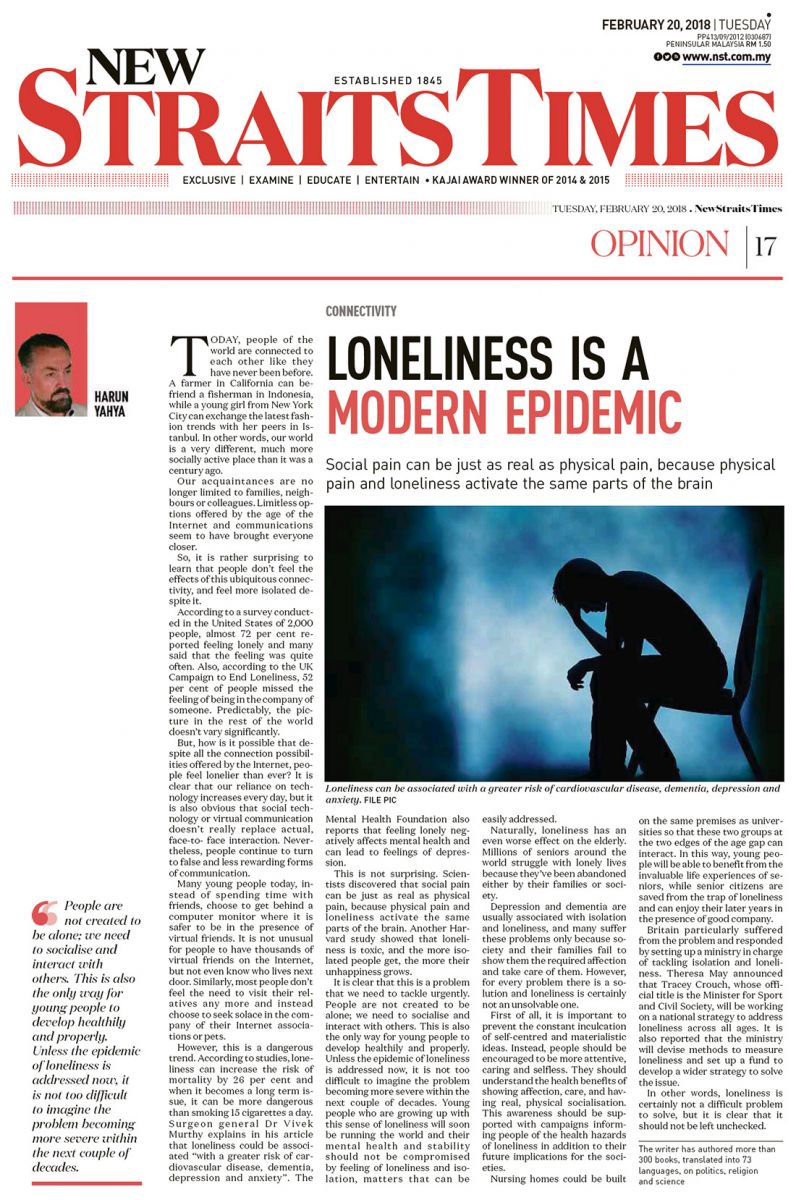Bigotry: The Dark Danger
Loneliness is a modern epidemic

Today, people of the world are connected to each other like they have never been before. A farmer in California can befriend a fisherman in Indonesia, while a young girl from New York City can exchange the latest fashion trends with her peers in Istanbul. In other words, our world is a very different, much more socially active place than it was a century ago.
Our acquaintances are no longer limited to families, neighbours or colleagues. Limitless options offered by the age of the Internet and communications seem to have brought everyone closer.
So, it is rather surprising to learn that people don’t feel the effects of this ubiquitous connectivity, and feel more isolated despite it.
According to a survey conducted in the United States of 2,000 people, almost 72 per cent reported feeling lonely and many said that the feeling was quite often. Also, according to the UK Campaign to End Loneliness, 52 per cent of people missed the feeling of being in the company of someone. Predictably, the picture in the rest of the world doesn’t vary significantly.
But, how is it possible that despite all the connection possibilities offered by the Internet, people feel lonelier than ever? It is clear that our reliance on technology increases every day, but it is also obvious that social technology or virtual communication doesn’t really replace actual, face-to- face interaction. Nevertheless, people continue to turn to false and less rewarding forms of communication.
Many young people today, instead of spending time with friends, choose to get behind a computer monitor where it is safer to be in the presence of virtual friends. It is not unusual for people to have thousands of virtual friends on the Internet, but not even know who lives next door. Similarly, most people don’t feel the need to visit their relatives any more and instead choose to seek solace in the company of their Internet associations or pets.
However, this is a dangerous trend. According to studies, loneliness can increase the risk of mortality by 26 per cent and when it becomes a long term issue, it can be more dangerous than smoking 15 cigarettes a day. Surgeon general Dr Vivek Murthy explains in his article that loneliness could be associated “with a greater risk of cardiovascular disease, dementia, depression and anxiety”. The Mental Health Foundation also reports that feeling lonely negatively affects mental health and can lead to feelings of depression.
This is not surprising. Scientists discovered that social pain can be just as real as physical pain, because physical pain and loneliness activate the same parts of the brain. Another Harvard study showed that loneliness is toxic, and the more isolated people get, the more their unhappiness grows.
It is clear that this is a problem that we need to tackle urgently. People are not created to be alone; we need to socialise and interact with others. This is also the only way for young people to develop healthily and properly. Unless the epidemic of loneliness is addressed now, it is not too difficult to imagine the problem becoming more severe within the next couple of decades. Young people who are growing up with this sense of loneliness will soon be running the world and their mental health and stability should not be compromised by feeling of loneliness and isolation, matters that can be easily addressed.
Naturally, loneliness has an even worse effect on the elderly. Millions of seniors around the world struggle with lonely lives because they’ve been abandoned either by their families or society.
Depression and dementia are usually associated with isolation and loneliness, and many suffer these problems only because society and their families fail to show them the required affection and take care of them. However, for every problem there is a solution and loneliness is certainly not an unsolvable one.
First of all, it is important to prevent the constant inculcation of self-centred and materialistic ideas. Instead, people should be encouraged to be more attentive, caring and selfless. They should understand the health benefits of showing affection, care, and having real, physical socialisation. This awareness should be supported with campaigns informing people of the health hazards of loneliness in addition to their future implications for the societies.
Nursing homes could be built on the same premises as universities so that these two groups at the two edges of the age gap can interact. In this way, young people will be able to benefit from the invaluable life experiences of seniors, while senior citizens are saved from the trap of loneliness and can enjoy their later years in the presence of good company.
Britain particularly suffered from the problem and responded by setting up a ministry in charge of tackling isolation and loneliness. Theresa May announced that Tracey Crouch, whose official title is the Minister for Sport and Civil Society, will be working on a national strategy to address loneliness across all ages. It is also reported that the ministry will devise methods to measure loneliness and set up a fund to develop a wider strategy to solve the issue.
In other words, loneliness is certainly not a difficult problem to solve, but it is clear that it should not be left unchecked.
Adnan Oktar's piece in New Straits Times (Malaysia):
https://www.nst.com.my/opinion/columnists/2018/02/337115/loneliness-modern-epidemic
2018-02-21 15:18:34






